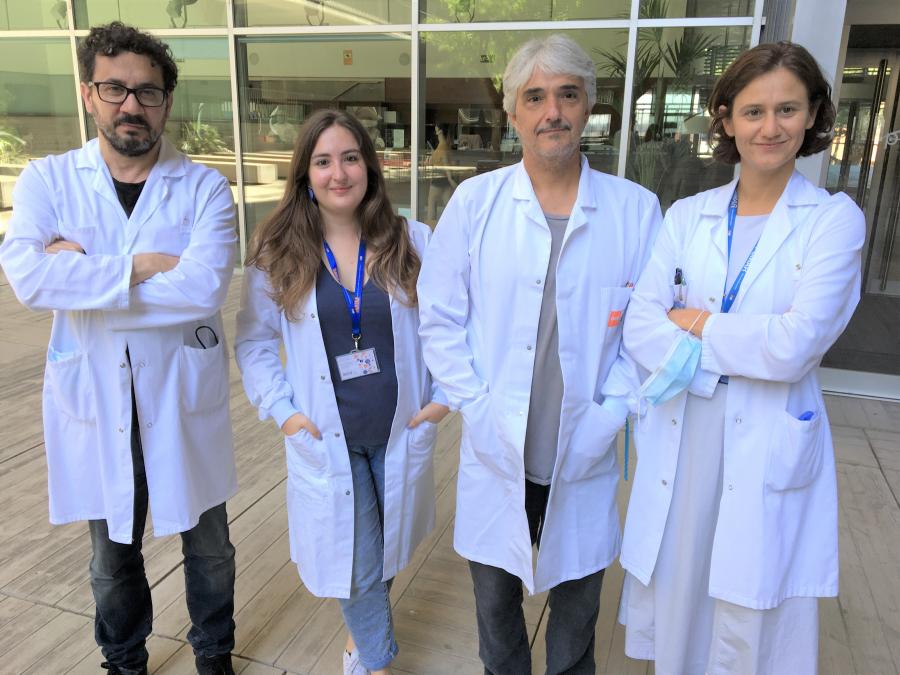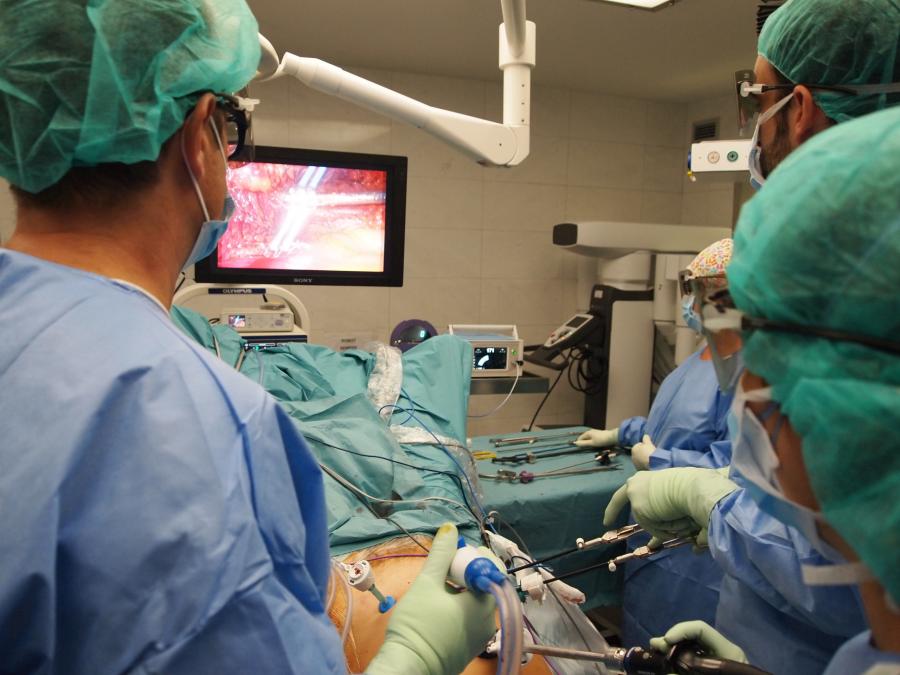
29/07/2021 - Press release
Researchers from the G-protein-coupled receptor-based drug development research group at the Hospital del Mar Medical Research Institute (IMIM) have been able to verify, with a degree of precision never before achieved, how the process that triggers the response of neurones in the brain occurs. This is an essential mechanism for understanding how moods or even processes such as addictions are produced, and in which neurotransmitters, molecules that help transmit information between neurones through specialised receptors, the G protein-coupled receptors (GPCRs), play a vital role. "Neurotransmission is one of the most crucial physiological processes, as its dysregulation can result in various neuropsychiatric disorders", explains Dr. Jana Selent, principal author of the study, published in the journal Chemical Science, and coordinator of the research group that led the work. Very small changes in how information is transmitted by these molecules can trigger different reactions in the brain, some of which are linked to behaviour, addictions and moods.
Més informació "Mechanism that triggers brain neurone response revealed"
21/07/2021 - Press release
Levels of omega-3 fatty acids in the blood are as good a predictor of mortality from any cause as smoking, according to a study involving the Hospital del Mar Medical Research Institute (IMIM), in collaboration with The Fatty Acid Research Institute in the United States and several universities in the United States and Canada. The study, published in The American Journal of Clinical Nutrition, used data from a long-term study group, the Framingham Offspring Cohort, which has been monitoring residents of this Massachusetts town, in the United States, since 1971. Researchers have found that omega-3 levels in blood erythrocytes (the so-called red blood cells) are very good mortality risk predictors.

Combining chemotherapy with a BRAF oncogene inhibitor proves effective at treating this disease. The study, published in the journal Oncogene, was led by researchers from the Hospital del Mar Medical Research Institute, Hospital del Mar and CIBERONC. This alternative paves the way towards a new approach for patients affected by this type of tumor, which has no cure in the most advanced stages or cases of relapse.
Més informació "A new approach to metastatic melanoma discovered"
22/06/2021 - Press release
6.4% of the European population suffers from depression, according to a study published in The Lancet Public Health. The work was led by researchers from King's College London, the Hospital del Mar Medical Research Institute (IMIM), the Parc de Recerca Sant Joan de Déu-Institut de Recerca Sant Joan de Déu, the Institute of Biomedicine at the University of León (IBIOMED), and the CIBER on Epidemiology and Public Health (CIBERESP). This figure is higher than that estimated by the World Health Organisation (WHO), which calculated the prevalence of this pathology in the European region at 4.2%. Depression is considered to be one of the leading causes of disability around the world, increasing the risk of premature death, decreasing quality of life and being a heavy burden on health systems. In fact, it is estimated that it may affect more than 300 million people worldwide.
Més informació "More than 6% of Europeans suffer from depression"
21/06/2021 - Press release
As a result of the collaboration between research centres in Italy and Spain, the PEGASUS study has been launched with the aim of demonstrating that, thanks to the liquid biopsy guidance tool, it is possible to increase the precision of post-surgical treatment for colon cancer patients. The Vall d'Hebron Institute of Oncology (VHIO), part of the Vall d'Hebron Campus, and the Hospital del Mar Medical Research Institute (IMIM), both in Barcelona; and the INCLIVA Health Research Institute at Hospital Clínico in Valencia, are the three Spanish centres taking part in this project. The study was instigated by Dr. Silvia Marsoni, from the FIRC Institute of Molecular Oncology (IFOM) in Milan, and is supported by the AIRC Foundation within the 5x1000 programme, which is coordinated by Prof. Alberto Bardelli of the University of Turin and the Institute of Candiolo FPO-IRCCS.
19/05/2021 - Press release
Liquid biopsy can predict which patients with localised rectal cancer are likely to relapse, even after initial chemotherapy and radiotherapy treatment, and prior to surgery. This is supported by a study led by doctors and researchers from the Medical Oncology and Pathology Departments at Hospital del Mar, as well as the Hospital de Mar Medical Research Institute (IMIM) and the CIBER in cancer (CIBERONC), which has been published in the American Association for Cancer Research journal, Clinical Cancer Research. The study analysed samples from 72 patients from twenty hospitals in Spain, taken as part of the GEMCAD1402 clinical trial conducted by the Spanish Multidisciplinary Group on Digestive Cancer.
Més informació "Liquid biopsy can predict relapse in patients with locally advanced rectal cancer"
13/05/2021 - Press release

Hospital del Mar-IMIM is leading an international clinical trial to evaluate the performance and suitability of new equipment for locating the sentinel lymph node in prostate cancer patients. The new tool is a flexible, miniaturized probe, which should improve the detection of a marker (a radioactive molecule) injected into the patient to locate the first node the tumour drains to. The technology SENSEI®, has been developed by the UK company Lightpoint Medical with the support of the Hospital del Mar Urology Service.
08/04/2021 - Press release
Doctors and researchers at Hospital del Mar and the Hospital del Mar Medical Research Institute (IMIM) have developed and validated a new risk model for breast cancer screening, based on four variables. This is the first time that it has been possible to predict the risk of developing this pathology in the long term, up to twenty years. The study, which has just been published in the journal PLOS ONE, examined data from almost 122,000 women who received a screening mammogram at the Hospital de la Santa Creu i Sant Pau between 1995 and 2015. This study is a continuation of the population-based breast cancer screening research led by Dr. Xavier Castells, head of the Epidemiology and Evaluation Service at Hospital del Mar.
09/03/2021 - Press release
People living with a patient undergoing an intensive weight loss treatment also benefit from this therapy. This has been demonstrated by a team of researchers from the Hospital del Mar Medical Research Institute (IMIM-Hospital del Mar) along with doctors from Hospital del Mar and the CIBER on the Physiopathology of Obesity and Nutrition (CIBERObn), in collaboration with IDIAPJGol, the Pere Virgili Health Research Institute (IISPV), IDIBELL, IDIBAPS and the Sant Joan de Reus University Hospital. The study has been published in the journal International Journal of Obesity. The study analysed data from 148 family members of patients included in the weight loss and lifestyle programme PREDIMED-Plus (PREVencióDIetaMEDiterranea Plus) over a two-year period. The researchers analysed whether these people also indirectly benefited from the programme, as they were not enrolled in the study and did not receive any direct treatment.
26/02/2021 - Press release
HDL cholesterol (high-density lipoprotein cholesterol) or good cholesterol is associated with a decreased risk of cardiovascular disease as it transports cholesterol deposited in the arteries to the liver to be eliminated. This contrasts with the so-called bad cholesterol, LDL (low-density lipoprotein cholesterol), which causes cholesterol to accumulate in the arteries and increases cardiovascular risk. Although drugs that lower bad cholesterol reduce cardiovascular risk, those that raise good cholesterol have not proven effective in reducing the risk of heart disease. This paradox has called into question the relationship between good cholesterol and cardiovascular risk, and researchers are now studying the characteristics of these HDL or good cholesterol particles.
Servei de Comunicació:
Marta Calsina(ELIMINAR)
Tel:
(+34) 93 316 06 80
Doctor Aiguader, 88
08226 Barcelona
© Institut Hospital del Mar
d'Investigacions MèdiquesLegal Notice and Privacy Policy | Cookie Policy | Site Index | Accessibility | Find Us | Contact